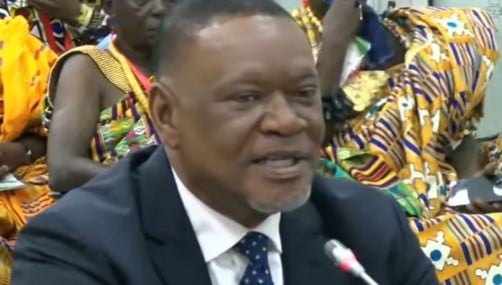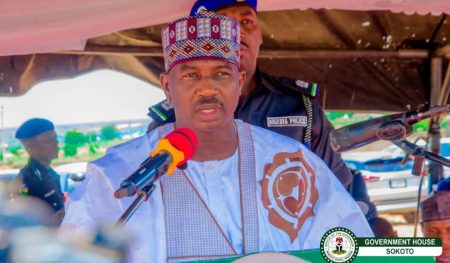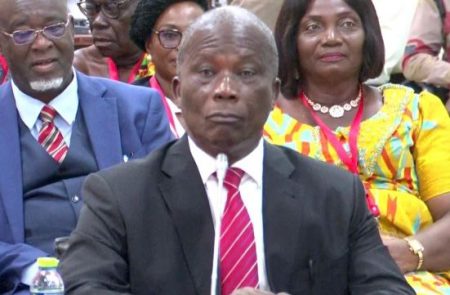Justice Senyo Dzamefe, a nominee for the Supreme Court of Ghana, addressed the parliamentary Appointments Committee during his vetting process, shedding light on a critical constitutional gap concerning presidential succession. The issue arose from an incident in May 2024 when President John Mahama, Vice President Naana Jane Opoku-Agyemang, and Speaker of Parliament Alban Bagbin were all simultaneously out of the country. This absence of the top three figures in the presidential line of succession sparked controversy and accusations from the parliamentary Minority of a breach of Article 60 of the 1992 Constitution. Justice Dzamefe acknowledged the constitutional silence on who assumes presidential authority in such a scenario, clarifying that no provision mandates the Chief Justice to be sworn in as acting President. His statement directly addressed the Minority’s contention that the Speaker should have been sworn in according to their interpretation of Article 60. The Minority’s argument referenced the Asare v. Attorney General Supreme Court ruling emphasizing the importance of uninterrupted constitutional leadership. This situation highlights a significant ambiguity in Ghana’s constitutional framework regarding succession, a gap that requires legislative attention to ensure clear protocols for future instances.
The constitutional debate surrounding presidential succession underscores the broader need for continuous review and refinement of constitutional provisions to reflect evolving circumstances and prevent potential crises. While the 1992 Constitution has provided a stable framework for Ghana’s governance, unforeseen scenarios, such as the simultaneous absence of the President, Vice President, and Speaker, reveal potential ambiguities that require clarification. Justice Dzamefe’s acknowledgment of the constitutional gap serves as a catalyst for a national conversation on this crucial matter. The incident, and the subsequent debate, highlights the importance of proactive measures to ensure the smooth functioning of the government and the preservation of constitutional continuity under all circumstances. The parliamentary discussion surrounding this issue offers an opportunity for lawmakers to address this gap, fostering a more resilient and adaptable constitutional framework.
Beyond the issue of presidential succession, Justice Dzamefe also addressed critical areas for reform within Ghana’s judiciary. He emphasized the urgent need for technological modernization, advocating for the integration of digital tools and processes to enhance the efficiency of court operations. Specifically, he championed the adoption of virtual hearings as a means to expedite justice delivery and improve accessibility to the courts. He proposed the implementation of fixed timelines for case resolution, recommending a three-month timeframe for criminal cases and six months for civil matters. These proposals aim to address concerns about delays in the judicial process, promoting swifter and more timely dispensation of justice.
Furthermore, Justice Dzamefe underscored the importance of investing in the judiciary’s human capital. He called for improved resources and training for judicial staff, emphasizing the need to equip them with the necessary tools and motivation to perform their duties effectively. By empowering judicial staff with the necessary skills and resources, he argued, the judiciary can enhance its overall productivity and performance. This holistic approach to judicial reform, encompassing both technological advancements and human capital development, reflects Justice Dzamefe’s commitment to strengthening the judiciary’s capacity to deliver fair and timely justice to all citizens.
In his responses to the Appointments Committee, Justice Dzamefe also reiterated his unwavering commitment to the principles of constitutionalism and democratic governance. He firmly expressed his support for Article 66(2) of the Constitution, which limits presidential terms to a maximum of two. This affirmation underscores his respect for the established constitutional framework and the importance of adhering to term limits as a safeguard against potential abuses of power. This commitment to constitutional principles reinforces the importance of checks and balances within the executive branch, ensuring a stable and predictable transfer of power.
Justice Dzamefe’s nomination, along with six other Court of Appeal judges, to the Supreme Court marks a significant moment in the evolution of Ghana’s judicial landscape. President Mahama’s nominations, made under the provisions of Article 144(2) of the Constitution, aim to strengthen the highest court in the land with experienced and qualified jurists. The addition of these new justices brings fresh perspectives and expertise to the Supreme Court, enhancing its capacity to interpret the Constitution and adjudicate on complex legal matters. The selection of Justice Dzamefe, given his insightful contributions during the vetting process, indicates a commitment to appointing individuals with a deep understanding of the law and a commitment to upholding the principles of justice and fairness.













